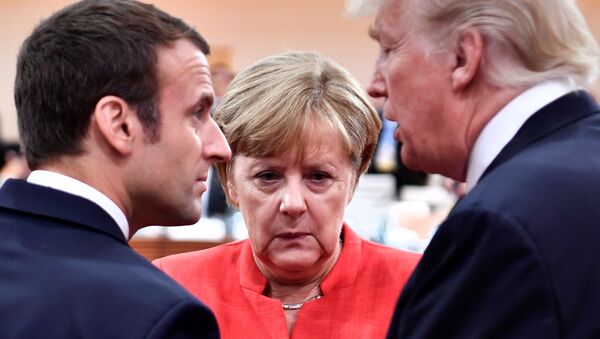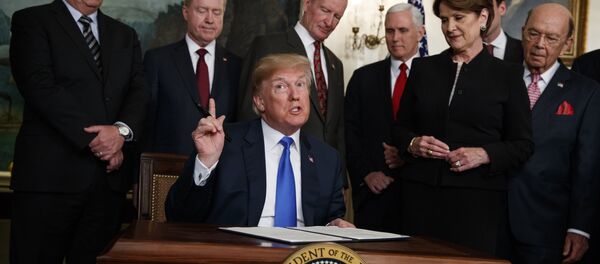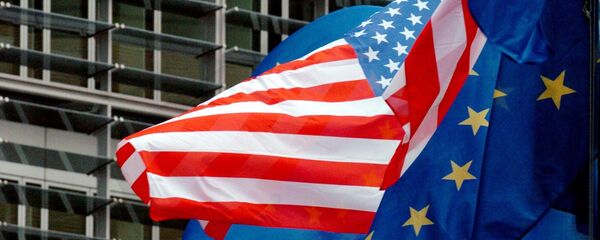The EU's Response
Responding to Washington's move on tariffs, the president of the European Commission, Jean-Claude Juncker, called the tariffs "totally unacceptable" and pledged to introduce counterbalancing measures in the coming hours, noting that "this is a bad day for world trade."
"I am concerned by this decision. The EU believes these unilateral US tariffs are unjustified and at odds with World Trade Organisation rules. This is protectionism, pure and simple. … The US now leaves us with no choice but to proceed with a WTO dispute settlement case and with the imposition of additional duties on a number of imports from the US. We will defend the Union's interests, in full compliance with international trade law," Juncker said in a statement.
A similar stance was voiced by European Commissioner for Trade Cecilia Malmstrom who pointed out that the bloc would take any necessary steps to protect the EU market from trade diversion, adding that the bloc would now trigger a dispute settlement case at the World Trade Organization (WTO).
"The US has sought to use the threat of trade restrictions as leverage to obtain concessions from the EU. This is not the way we do business, and certainly not between longstanding partners, friends and allies," she added.
READ MORE: EU Trade Chief Believes US Unlikely to Prolong Steel, Aluminum Tariff Exemptions
German Chancellor Angela Merkel warned that Washington's imports tariffs risked leading to an "escalation spiral" in global trade.
Germany's Foreign Ministry slammed the US metal duties as "illegal," with the country's foreign minister, Heiko Maas, vowing a united European response.
"Our answer to 'America First' can only be 'Europe united,'" he said in a statement.
The UK government's spokesperson stated that Britain and other European Union countries are close allies of the US and thus should be "permanently and fully exempted" from the US metal tariffs.
Austrian Chancellor Sebastian Kurz said the European Union does not want to wage a trade war with the United States but has to respond to the US decision to introduce new tariffs on steel and aluminum products.
"US tariffs — are a wrong way, they pose threat to European economic interests. The European Union does not want to be engaged in a trade war with the United States that would inflict damage on both sides, but it has to introduce response measures. We are well prepared for this," Kurz pointed out.
Belgian Foreign Minister Didier Reynders also said that he regretted the US decision.
"I regret the protectionist decision of the United States to introduce tariffs on steel and aluminum from Europe… The European Union should act jointly and under international rules: a procedure in the World Trade Organization, measures of balancing and protection," the minister noted.
France's President Emmanuel Macron called Trump's decision a "mistake," stressing that Washington's tariffs are "illegal." Macron went on saying that he intended to speak to Trump on Thursday evening.
According to France's junior trade minister, Baptiste Lemoyne, US consumers will be the first "losers" after the introduction of Washington's tariffs.
"We are getting ready to put in place safeguards, rebalancing measures because we won't let unjustifiable and unjustified measures go unanswered," he told reporters, adding that he is happy that "in this moment of truth, the EU is united."
Mexico Fires Back
Mexico has decided to introduce its own tariffs on a range of products imported from the United State in response to steel and aluminum duties imposed by Washington, the country's Ministry of Economy said.
"In light of duties imposed by the US, Mexico will introduce equivalent measures to various products, such as flat steel [hot and cold rolled steel, including steel sheet and various pipes], lamps, … sausages and food products, apples, grapes, blueberries, various cheeses, up to an amount comparable to the level of financial losses [caused by the duties]," the ministry said in a statement.
Mexican Foreign Minister Luis Videgaray said that the country would continue negotiating with Washington to revise the North American Free Trade Agreement (NAFTA) despite "unjust and unilateral" tariffs introduced by the US.
Canada to Retaliate
Canada's Prime Minister Justin Trudeau called tariffs "unaccaptable" and pledged to impose retaliatory measures against Trump's move. He went on saying that nevertheless the country would continue to negotiate with Washington.
Canadian Foreign Affairs Minister Chrystia Freeland further elaborated that Canada will impose retaliatory tariffs against US steel, aluminum and other products totaling 16.6 billion Canadian dollars ($12.8 billion).
"We are imposing dollar-for-dollar tariffs for every dollar levied against Canadians by the US," she stressed.
According to the minister, Canada is imposing tariffs on US steel and aluminum products beginning on July 1 2018 and will do so until Washington end its restrictive measures.
Freeland added that the unilateral US trade restrictions are also in violation of the NAFTA and WTO rules, and vowed to work with EU allies on countermeasures.
US Introduces Metal Tariffs
Earlier in the day, Ross announced that Washington would start imposing a 25 percent tariff on steel imports and a 10 percent tariff on aluminum imports on the EU, Canada and Mexico at midnight tonight.
"We look forward to continued negotiations, both with Canada and Mexico on the one hand, and with the European Commission on the other hand, because there are other issues that we also need to get resolved," the US commerce chief told reporters.
He did not elaborate on whether steps could be taken to reverse the decision, however.
The US trade chief noted that negotiations with Canada and Mexico over revising the North American Free Trade Agreement (NAFTA) were "taking longer than we had hoped."
Speaking further on NAFTA, Ross said that there was "no longer a very precise date when they may be concluded and therefore Canada and Mexico were added into the list of those who will bear tariffs."
The commerce secretary made the tariff announcement in Paris after a meeting with EU trade chief Cecilia Malmstrom in a last attempt to negotiate an agreement on the duties.
Trade tensions between the European Union and the United States have been running high since March when US President Donald Trump introduced a 25 percent tariff on imported steel and a 10 percent tariff on imported aluminum. A number of countries, as well as the European Union, were exempted first until May 1 and then for one more month until June 1.
The US move already prompted a backlash from China, which has introduced its own tariffs on goods produced in the US.



